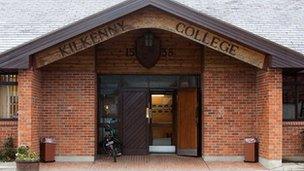Fee-paying Kilkenny College moves to Irish state sector
- Published

Kilkenny College is one of Ireland's oldest schools
A second fee-paying Protestant secondary school in the Republic of Ireland has decided to move into the state sector.
Kilkenny College is to follow the example of Wilson's Hospital in the Irish midlands.
Kilkenny College, on 62 acres on the outskirts of the medieval city, is one of Ireland's oldest schools.
It was founded in 1538 and former pupils include Jonathan Swift and the philosopher, Bishop George Berkeley.
Today with its surrounding rugby and hockey pitches the red-brick college is a co-ed school with 764 students, 428 of whom are boarders.
It is 75% Protestant, mainly Church of Ireland, the rest of the students are Catholic, Muslim, Jewish, Hindu and atheist.
The school has been charging fees of 9,680 euros for boarders - about £8,300 - and 4,148 euros for day students, about £3,500.
But the school principal, Ian Coombes, said the recession was hitting parents hard, and the old idea that all Protestants in the Republic are well-off is truly out of date.
"Certainly in rural Ireland you find Protestants in every walk of life and in every type of employment," he said.
"A very large proportion are in agriculture, but in 2011 average farm incomes were only 24,000 euros (£20,600) in the Republic of Ireland.
"So, the perception may well be, in Brendan Behan's phrase, of the Anglo-Irish being a Protestant on a horse, but today there certainly wouldn't be many well-off people.
"And if you look at the car park on a Friday here, you will find quite a lot of very old vintage cars and not too many brand new Mercedes, I can tell you."
With increasing numbers of parents having trouble meeting the fees, Kilkenny College has decided to join the state education sector.
The college is a co-ed school with 764 students
But it will remain a Protestant school.
And, indeed, many Church of Ireland people have been in contact with the college to say, now that it is free, they will be able to send their children there.
Boarders will still have to pay for their upkeep but the teaching will be free.
It is known that five other schools - Catholic and Protestant - are contemplating following Kilkenny College's example.
At the moment the Irish taxpayer pays nearly all the salaries of teachers - certainly all of them in the non fee-paying sector where there is a teacher/pupil ratio of 1 to 19.
But Education Minister Ruairi Quinn recently increased the pupil-teacher ratio in the fee-paying sector to 1 to 23 that the state will pay for.
Further increases are expected.
So private schools have been using fees partly to lower their teacher pupil ratio and partly to improve their facilities.
Most of the private schools are happy to remain outside the state sector.
But several Labour Party TDs and one junior minister have called on Mr Quinn, their party colleague, to completely end the subsidies to the fee-paying schools.
Ruairi Quinn denies that his decision to increase the ratio for non-state schools was ideological.
"The teachers of all our schools, including the 55 fee-paying, are paid by the state," he said
"So, I, as education minister, had to look at a growing pupil population and tight resources and see how could we develop education and use those tight resources as equitably as possible.
"This was about equity in terms of allocation of resources. It had nothing to do with an ideological position for or against fee-paying schools, for or against Catholic as against Protestant schools".
The school is set on 62 acres on the outskirts of Kilkenny
Mr Quinn's department of education this week published an analysis of the fee income received by Ireland's 55 private second-level schools and found that the schools share more than 80m euros (£69m) in additional income between them every year, compared to similar sized schools outside the fee-charging sector.
But the report also calculates that if all the country's private schools decided to enter the free education sector, it would cost the hard-pressed taxpayer 23.5m euros (£20.2m) in additional funding.
So, while the recession may force more private schools into the state sector, the government, in turn, will have to find more money to pay for teachers' salaries and other costs.
It is probably just as well then that a good education teaches that many issues are rarely black and white, just different shades of grey.
- Published24 October 2012
- Published9 February 2012